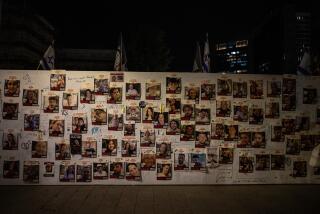A war by any other name
It was President Bush himself who insisted on calling it a global war on terror. He wanted to indicate that this was not just another piddling law enforcement action, but an all-out, full-scale military response to Sept. 11 that would involve U.S. troops around the globe.
“A war between good and evil,” he called it. A war “to save the world.”
But now, apparently, a decision has been made that the language of war isn’t working for him anymore. So in recent days, the “global war on terror” -- which had been conveniently shortened to GWOT in bureaucrat-speak -- has been shelved in favor of the “global struggle against violent extremism.”
Frankly, the Bushies were always conflicted about the word “war.” Gen. Richard Myers, the chairman of the Joint Chiefs of Staff, has said that early on he objected to use of the term because it seemed to dump the problem into the lap of the military. Former Secretary of State Colin Powell was said to have objected to the word as well, perhaps, in his case, because it seemed to leave his diplomats over at the State Department on the sidelines. But in the days after Sept. 11, Americans wanted war, and that’s what they got.
The idea of a global war on terrorism proved its worth. It got us to Afghanistan (rightfully, in my opinion). It then mysteriously carried us into Iraq to eradicate a terrorist threat that did not exist until we got there. It provided the legal justification for the administration’s controversial detention and interrogation policies, and it served as the defense for them after they were uncovered. And in November of last year, it won an election.
Ivo Daalder of the Brookings Institution recently found that Bush used the term “war” three times as often in the six months leading up to the 2004 election as in the six months after. In the month before the election, he invoked it 71 times. But since the polls have closed, it’s only been important enough to raise an average of 11 times in any 30-day period.
Even in his last publicized news conference, there was no GWOT, and the term “war” was mentioned only once. In contrast, Bush used the d-word (diplomatic or diplomatically) nearly a dozen times.
War, it seems, is so 2004. Despite Vice President Dick Cheney’s insistence that the insurgency in Iraq is in its “last throes,” it is difficult to look at the summer of 2005 as a success story for counterterrorism efforts. In London, Israel, Egypt and Iraq, civilians and military personnel are being targeted at alarming rates.
The shift to a more, shall we say, nuanced approach to language is no doubt the result of two important realizations. First, the war analogy may have captured our imagination, but it never really captured the true nature of how to counter the threat we faced. Combining military efforts with diplomatic, economic, political and intelligence cooperation has always been how nations successfully counter terrorism. Only the administration’s political use of the 9/11 tragedy kept the notion of war alive. It was misleading and distorting.
Besides, the war analogy is spent, and the administration knows it. With troops facing a deadly and constant enemy in Iraq, with soldiers still deployed in Afghanistan, with recruitment of new bombers seemingly exceeding our ability to recruit troops, we do not have the war option left when terror strikes in the rest of the world. Not in Iran, not in North Korea, not in Pakistan and certainly not, as we now have seen, in Britain, where this month’s suicide bombers lived and eventually died.
With polls suggesting that the American people are now questioning all aspects of the war in Iraq and, along with it, many aspects of the war on terrorism, the war terminology has outlived its usefulness.
But the White House should be prepared for the possibility that its new catchphrase -- the global struggle against violent extremism -- may not bring the same benefits that GWOT once did. Admittedly, “G-SAVE” has a certain optimistic, selfless sound to it. But no one quite knows what it means. Does it reflect a change in policy? Or just a change in rhetoric?
War, struggle, fight, effort, whatever -- we still don’t seem to be describing the smooth intelligence operation; the tough law enforcement; the suave, cooperative diplomacy; the delicate nation-building and vigilant homeland security that is needed to complement our military prowess. If administration officials put as much effort into getting these jobs done as they apparently put into rethinking their talking points, perhaps we’d have some real success in this global, uh, endeavor. And what we call it would matter a lot less.
More to Read
Get the L.A. Times Politics newsletter
Deeply reported insights into legislation, politics and policy from Sacramento, Washington and beyond. In your inbox three times per week.
You may occasionally receive promotional content from the Los Angeles Times.










